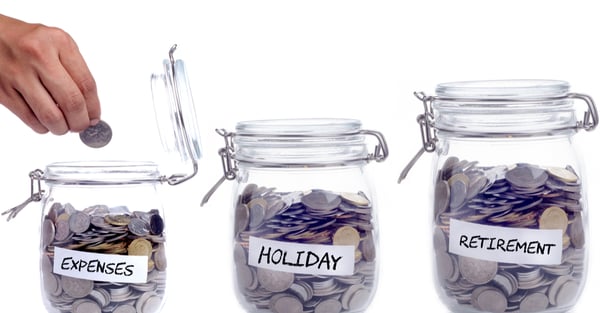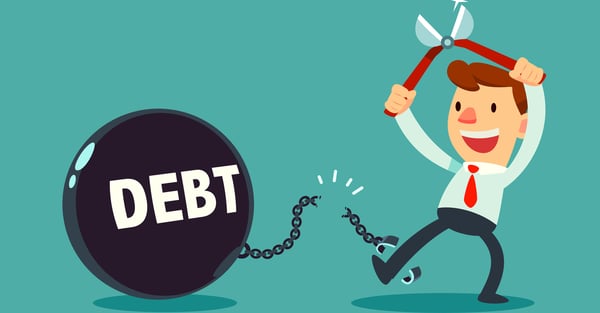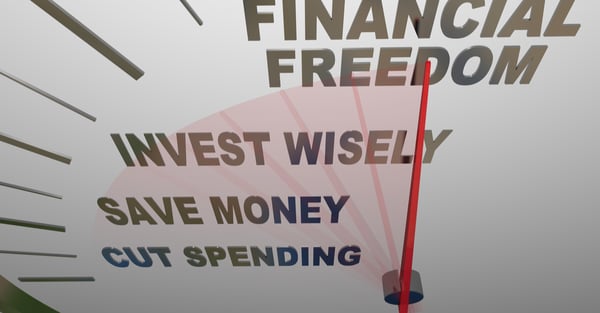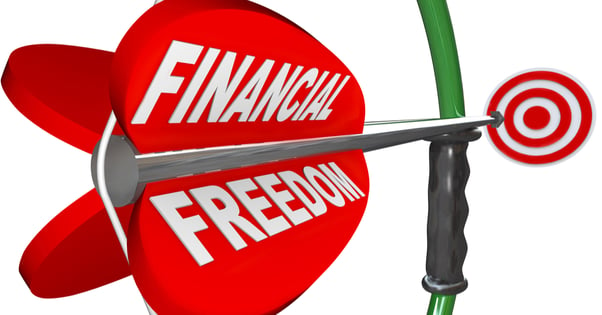Who wouldn't want to be free of debt and have enough money to live a comfortable life? Unfortunately for many, they have more debts stacked up than money saved in the bank. This is the reality of life. But it doesn't mean that you just have to live with it.
No matter how deep in debt you are, there is a way out. The same is true if you have zero savings. There are solutions to achieve financial freedom, investment options that you can explore to boost your earning potential, and simple steps to get out of debt.
Check out: 4 Smart Financial Goals to Set in 2020
All these will be tackled in this article. The goal is to provide you with the knowledge to become financially independent. Financial literacy is the first step to well-managed personal finance, after all. At the end of this post, you will:
- Gain a better view of what financial freedom looks and feels like to you.
- Understand the power of knowing you’ve become financially independent.
- Learn how to gain financial freedom, even with existing debts.
- Know your short- and long-term investment options that will help you to consistently earn money.
- Identify the investment risks you're willing to take.
- Gain financial freedom and sustain it for as long as possible.
What financial freedom looks like to different people

You say you're not even close to being financially secure. But your situation may be something others only dream about. Different people define financial freedom differently. How do you imagine it to look and feel like?
- You're not living paycheck to paycheck and have a bit of an emergency fund.
- You have enough savings that you can afford to quit your job for a bit.
- You earn enough to save for an emergency fund, do the things you do, and still have extra left by the end of the month.
- You can afford to spend more time with family or to go on a holiday without completely going broke.
- You earn enough to save for early retirement and still spend on things you enjoy.
- Your income allows you to maintain your standard of living right through to retirement.
- You have enough money saved to realise your dream retirement and still do more.
- You have more money than you could ever spend in one lifetime.
Which situation best describes your idea of financial independence? Is it the one where luxury is the norm or are you fine with being able to save for an emergency fund and nothing more? What you choose will dictate the level of work you need to do to reach your goal.
Obviously, you have to work harder to increase your income. You have to be brave enough to explore different investment options if you want to double or triple your money without doing the same amount of work.
There are trade-offs that you also need to deal with. For example, if you want to have enough money for an emergency fund and still spend on things you enjoy, you have to make certain sacrifices.
- Move to an area with a lower cost of living.
- Downsize to a smaller house or a more practical car.
- Take on two jobs or work another part-time job.
- Put off having children or even pursuing your passions.
You’ve probably said it before, “Just you wait until I have enough money.” Given the rewards and sacrifices, think long and hard about how you see yourself as financially independent. Close your eyes and imagine. Then, think about what you’re willing to do to gain freedom and the outcome of every decision you make. This will help you better chart the path to your goal.
How do you know if you're financially independent? (Why does it matter?)
Let's assume for one moment that you've finally experienced your idea of economic self-reliance. But are you truly free from financial worries? How long before you start to accrue debts? It's important to know the difference between having enough money and being financially self-sufficient for life.
So, here's a simple test that will determine your level of financial independence. Whether you're solvent, stable, secure, independent, or abundantly wealthy.
You're solvent if you answer YES to the following questions:
- Do you earn enough profit to pay off your financial commitments without help from anyone else?
- Does your income exceed whatever expenses you have?
- Do you pay your debts using your surplus income?
You're stable if you answer YES to the following questions:
- Do you have zero consumer debts, from credit card to auto loans?
- Do you have so-called "good debts"?
- Have you built up your emergency funds and then some?
You're in the black if you answer YES to the following questions:
- Were you able to eliminate both good and bad debts?
- Can you afford to quit your job at a moment's notice because you have enough savings to tide you over?
- Do you feel no trepidation or worries at all about the future?
You're financially secure if you answer YES to the following questions:
- Do you have investment options that are earning more than enough to fund your basic needs?
- Do you have money saved and invested in long-term and/or short-term investment options?
- Can you afford to live comfortably even if you never have to work again?
You're financially independent if you answer YES to the following questions:
- Is your investment income paying for your current standard of living?
- Do you have investments that allow you to live the way you do for the rest of your life?
- Do you have more than enough to fund for both the basics and creature comforts until the day you die?
You're abundantly wealthy if you answer YES to the following questions:
- Do you have passive income that will pay for your lifestyle in various levels of luxury?
- Do you have the freedom to do, pay for, and indulge in whatever you want, from buying a private jet to travelling all over the world?
The more secure you are in your financial status, the simpler the questions you’ll have to deal with. It’s true what they say, money can make a difference. So how do you become abundantly wealthy or even just in the black when you have loans and dues to pay?
I have debts to pay, is there a chance to gain financial freedom?

Who doesn't have debts? Even the wealthiest have debts. They just have financial advisers to help them deal with their IOUs differently. Most people owe someone something, whether an individual or an institution. This is why freedom from debt is such a big deal. Some even make it their ultimate goal.
Debt-free, however, doesn't necessarily mean you're financially secure and independent. But it is the first step to getting there. The best strategy to pay off debts is to stick to the terms and then save the extra money you have.
Avoid using your extra funds to pay off more of your debt capital in the hopes of reducing it. You will end up wasting your time. What you should do is to build your cash flow.
1. Create a balance sheet
List all your assets and liabilities to identify what you owe and your net worth. Do you have a positive or negative net worth?
2. Get a good picture of your cash flow system
Analyse your income statement and how it compares with your expenses. If you have more expenses than income, then you have a negative cash flow.
3. Measure your debt-to-income ratio (DTI)
To determine your DTI, simply divide the total monthly fixed loan payments over your total monthly income.
The fixed loan payments refer to all types of liabilities you have, such as student loan, mortgage, and credit card payments. The higher your DTI, the more financially stressed you are. Creditors often see this as indicative of someone who is likely to default on their loan.
4. Increase cash flow and assets
Now that you know the real score of your finances, it's time to pay off your debts. How? By paying yourself first. This may seem counter-intuitive since paying off debts is the goal. But think about it. If you pay yourself extra now, you will be able to save money to create future cash flow. This does not mean you don't settle your dues. Just don't pay extra on your debts to clear it sooner than the agreed terms.
Direct what extra money you have into savings. Doing so comes with benefits, such as having money when unexpected expenses come or when you lose your job. So, the goal now is to increase cash and not to pay off debts too quickly.
5. Build assets that you can use
This means investing in cash value life insurance, a savings account, and other assets that will give you easy access to your money. With enough money saved, you will have the option to eliminate a liability once and for all. Moreover, you will have funds that will pave the way to economic freedom.
What are your investment options?

It's not enough to increase your cash flow. You need to secure your finances through investments, too. Doing so is the best way to earn more without working yourself to the ground. There are different investment options to choose from that run over the short-term or long-term. How is one different from the other?
Long-term investing
- Capital preservation
- Taking a certain amount of risks for higher rewards
- Higher potential for your capital to appreciate
Short-term investing
- Best for when you need money at a certain time
- Investing in less than three years
- Lower returns in exchange for financial safety
One is not necessarily better than the other. But you need to better understand what works best for your investment needs. Below are different investment options you can explore.
Best long-term investment options
Stock Fund
This is ideal for people who are interested in aggressive investing but lack the time and desire to make a hobby out of it. You get a weighted average return when you buy a stock fund, which is less volatile compared to when you hold just a few stocks.
Pros
- Less risky
- Less work involved
- More stable returns
Cons
- Not all of the companies you own will excel in a given year
- You may lose or gain as much as 30% in extreme years
Real Estate
Many consider this as one of the best investment options because of high commission and returns, especially when held for a long time. You can also borrow money from the bank to invest in real estate.
Pros
- Interest rates are almost always attractively low
- Comes with numerous tax benefits
- High returns and commissions
Cons
- Requires high initial investment
- A lot of money is tied up to one asset
- Out-of-pocket mortgage payments and maintenance costs
Dividend Stocks
From the name itself, this type of investment option pays a regular cash payout as a dividend. This means regular income.
Pros
- Earn more by 2% to 3% annually
- Payouts may go as high as 10%
- Less volatile
- Earn more from established and mature companies
- Safer investment option
Cons
- May significantly rise and fall during a rough period in the stock market
- Stocks may plummet if a company doesn't earn enough to pay dividends
Growth Stocks
These are mostly stocks of tech companies with high returns. Although considered the best-performing investment options over time, it can lose value quickly in a bear market.
Pros
- High earning potential
- More rewards when investing in high-growth companies
Cons
- Requires high-risk tolerance
- Quickly loses value when a recession hits
- Takes time to analyse a company to invest in
Bond Funds
These are safer investments because one fund contains numerous bonds that come from a range of issuers. Returns are much lower compared to a stock fund.
Pros
- One of the safer investment options
- Relatively stable even as interest rates fluctuate
Cons
- Not all issuers are the same
- You earn less but investments are much safer
- Government bonds pay even less annually
Best short-term investment options
Online Savings Account
You get better interest rates with this type of investment than you would from traditional banks. You can earn 1% to 2% per year with high-interest accounts.
Pros
- More conservative option
- Higher annual interest rate
- Savings accounts are backed by insurance
- Higher liquidity
Cons
- Low returns in exchange for lower risk
- Less flexible transactions
Certificate of Deposits (CD)
These are deposits that have higher interest rates because of the longer lock-in period. In three years’ time, an investor can cash in on the accumulated interest. But the yield is higher if CDs are invested for longer.
Pros
- Receive monthly interest payments or one-time payment upon maturity
- Deposits are backed by insurance
Cons
- Funds may be withdrawn before maturity but with penalties
- Average returns are as low as 0.5% to over 3%
- Funds are inaccessible during the locked-in period
Short-term Bond Funds and ETFs
These are usually managed by professional financial advisers. Expect higher earning potential with this type of investment.
Pros
- Relatively stable
- May offer investors a higher yield
- Shorter maturity rate at two years or less
Cons
- Payouts will depend on the current condition of the market
- Yield is vulnerable to market fluctuations
Money Market Accounts
These work similar to regular savings accounts where your money is easily accessible, you earn interest on your deposits, and you can write checks when needed. It practically combines the best of savings and checking accounts. Moreover, you earn higher interest rates than you would with a savings account.
Pros
- Interest rates are higher than that of a savings account
- Highly liquid with some withdrawal restrictions
Cons
- Requires a minimum deposit to get started
- Interest rates tend to be too low to protect investors from inflation
Municipal Bonds
Although one of the riskier short-term investment options, municipal bonds have higher yield potential. It is issued by the state, local or government agencies.
Pros
- Exempted from interest tax
- Returns can go as high as 4%
- Higher payouts upon maturity
Cons
- Value goes down when interest rates rise
- More vulnerable than stocks against inflation
Make sure to weigh in on the advantages and disadvantages when choosing a product to invest in. Analyse the risk and rewards to find the best option to invest your money in.
What about Forex investment?
Investing in Forex is either long-term and short-term, depending on the kind of trader you are. In the Forex market, traders or investors buy and sell currencies, with trades held for just a few minutes or weeks to years.
Pros
- Low volatility, high liquidity
- Allows portfolio diversification
- Flexible trading hours
- Low-cost investment
Cons
- Leverage risk is high
- You can lose as much as you earn
- May lead to a significant loss in a volatile market
To maximise yield in Forex trading, it's best to use brokers with a trustworthy reputation and are credible. (Learn how Fullerton Markets helps traders earn in the Forex market through unparalleled fund safety and a system of wealth creation.)
Understanding risk tolerance
In every investment product, there's always an associated risk. Even those considered safe investment options have some degree of risk, especially with the unpredictable market conditions. As an investor, it's important that you understand the level of risk you can tolerate. In other words, how much money are you willing to lose? Try to identify yourself with the characteristics of the following investors:
Low-risk tolerance
You lose sleep when investment value declines. If so, you're better off investing in a basic savings account, CDs, and Money Market Accounts.
Medium-risk tolerance
You can handle smaller declines in value but are sure to stress out on bigger ones. You'll be much happier with dividend stocks and other stocks from established companies. Another investment option is mutual funds that maintain a balance between bond holdings and stocks.
High-risk tolerance
Your primary goal is to maximise investment returns over the long term. No ups and downs bother you.
You are comfortable investing in higher-yield products, including stocks of companies that are just starting out but have growth potential.
So what kind of investor are you? By knowing how much risk you can tolerate, you can invest in the right products and better manage your expectations. No need to stress yourself out unnecessarily.
How to choose an investment option based on risk tolerance?
Once you become aware of your risk tolerance as an investor, it will be easier to choose the best investment options on which to build your portfolio. Just look at the risks involved for every investment option and decide accordingly. Because there are trade-offs and rewards with every investment, it would also help if you choose based on other factors:
- How specific investment product works
- The type of returns expected, whether income or capital gains
- How returns are generated
- The costs involved in holding, buying and selling
- The length of time before returns are received
- Legal and tax implications
Most importantly, take a good look at how an investment option will contribute to your portfolio, especially in terms of diversifying it.
How do you stay in the black? (Tips to stay financially independent)

Say you managed to pay your debts while increasing your cash flow. You also invested in products that suit your risk tolerance. Depending on the investment you choose, you could be seeing higher income and returns in two years or so. Or, you have enough savings that you've become financially secure. Time to sustain that level of financial freedom you've achieved. How do you remain financially independent for as long as possible?
Keep a list of your financial goals
What better way to stay on track than to aim to stay in the black? Your goals may include saving $20,000 as a down payment for a property or adding $100,000 to your savings account within a year.
Keep an eye on your balance sheet
Track your savings, spending, net worth, and whatever financial aspects that must be kept positive (see how you can start creating your own here). Before you know it, you'll have an organic investment that will help you stay financially independent.
Always pay yourself first
Don't stop doing this, even if you have extra funds that provide enough cushion. You'll never know when you'll have to break the bank for unexpected expenses.
Make sure to spend less
Ever heard of frugal billionaires? You would think Warren Buffett, Richard Branson and Charlie Ergen would splurge on just about anything, given their billion-dollar net worth. But they spend relatively less money. Why?
Because there's freedom in spending within or even below your means. So take a page out of their books and practise frugality.
Your turn...
Are you willing to give these tips a try and become solvent or abundantly wealthy? There's no harm in doing so, and you're in for major changes in your finances if you succeed.
Do you have other ideas on how to stay financially free for the rest of your life? How about tips and tricks for successful investing? Let us know in the comments below.
Looking to grow your investments and generate income in the world's largest financial market? No better place to start than right here with us! Start trading with Fullerton Markets today by opening an account:
You might be interested in: 4 Smart Financial Goals to Set in 2020











